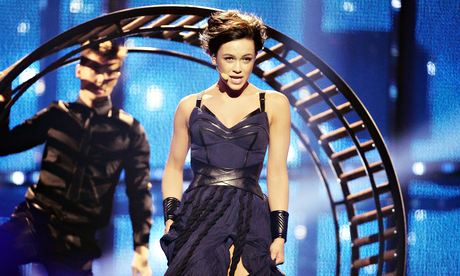
When Mariya Yaremchuk was selected last year to represent Ukraine in tonight's Eurovision song contest, she might have fancied her chances.
After all, the bloc voting that has for years subverted the event has habitually played in Ukraine's favour. Getting good scores is easier if you have a dozen sympathetic regional allies such as Belarus, Azerbaijan and, yes, Russia that vote for you year after year. Ukraine came third last year, fourth in 2011, second in 2007 and 2008 and won in 2004.
This year – the 59th for the Europop spectacle – that might be different. It is certainly hard to see Russia voting for anything Ukrainian at the moment. Other post-Soviet countries may be guarded, however catchy her entry song, Tick Tock, might be. And for Yaremchuk herself, the escalation of violence back at home is making it hard for her to focus on preparations for the Copenhagen extravaganza.
"Now there is bloodshed in my country," Yaremchuk said an interview the day after scores of people were killed in Odessa last weekend.
Born in the western city of Chernivtsy in 1993, she surprised many in 2012 when she expressed "moral support" for the pro-Russian party of the ousted president Viktor Yanukovych. She explained her comments as an effort to reunite the long-divided country, and insists she is apolitical and will be representing the entire country in Denmark. "I will be only with Ukrainian people," she said. "I will not be alone at the stage. Some 46 million Ukrainians will be behind my back. I want to perform well for them, on their honour and in the name of them."
Another Ukrainian Eurovision star, the 2004 winner Ruslana, conspicuously supported the Kiev protest movement this winter, singing her victorious tune night after night to the Maidan protesters, who were demanding closer European integration.

Yaremchuk was not seen at the protests, but she says she donated money and blood for the casualties of the violence that followed. Now she believes music will be a good way to reunite the country. "We will try to unite people with the language of music and Eurovision would be the best way to do so," she said.
Tick Tock is a song about love and time, Yaremchuk said. In true garish Eurovision style, a man will run inside a giant rotating wheel during the performance which opens the show.
"The main message of it is that time exists now, you shouldn't lose it, and if you found your love than you have to hold it and fight for it until the end," she said, adding that she did not want to make predictions about the result.
Some speculate that what Ukraine loses from its perennial allies it might gain from sympathy votes further west, but Yaremchuk said she was not thinking about that.
"I don't want to think about Russia or any other country. I think only about Ukraine," she said. "I want to be worthy of Ukrainians who have proved to be a very strong nation that deserve a better future in Europe."
Ukraine's chance of taking the Eurovision crown are looking optimistic, with the odds of Yaremchek singing her way to victory currently standing at 16/1, compared with 50/1 for the Tolmachevy sisters, the angelic twins who will be representing Russia. At the semi-finals on Tuesday, the two 17-year-olds were greeted with boos from the 10,000-strong audience in Denmark, thought to be a response to Vladimir Putin's aggressive actions in Ukraine but also a statement against Russia's strident anti-gay legislation.
A Russian politician last week condemned Eurovision as a "sodom show" which displayed "blatant propaganda of homosexuality and spiritual decay".
Among the geopolitical strife and outrageous offerings from contestants such as Conchita Wurst – the cross dressing drag queen representing Austria – it could be a struggle for the UK's entrant, Molly Smitten-Downes, to stand out from the crowd.
Born in Leicester, the 27-year-old musical unknown was selected as the Eurovision candidate after she caught the eye of BBC executives. Her song, Children of the Universe, has an anthem-style chorus and her performance promises to make full use of explosive pyrotechnics to reel in the 170 million viewers who tune into the singing contest.
With odds of her winning standing at 9/1, many are optimistic she could redeem the UK's pitiful past record on the Eurovision stage, where Englebert Humperdinck scored only 12 points in 2012 and Bonnie Tyler was placed 19th last year.
Currently, Smitten-Downes's main competitors among her 25 fellow contestants are Sweden's Sanna Nielsen with her power ballad Undo, as well as Austria's Wurst who has already captured Europe-wide attention. At Thursday's semi-finals – sporting high-heels, butterfly eyelashes and a full beard – the drag queen was greeted with loud cheers, and the bookmakers are now predicting her grandiose ballad Rise Like a Phoenix could go for the win.
"The beard is a statement to say that you can achieve anything, no matter who you are or how you look," said Wurst.
The least popular entries include the Belarus entry, Cheesecake by Teo, with victory odds of 250/1, followed closely by the wild-haired flautist from Slovenia, Tinkara Kovac, who is a 200/1 outsider. There are some who are not so keen on winning the Eurovision crown as it can be an expensive title to hold. The winner has to shoulder the full hosting duties for the competition next year estimated to cost about £30m.

